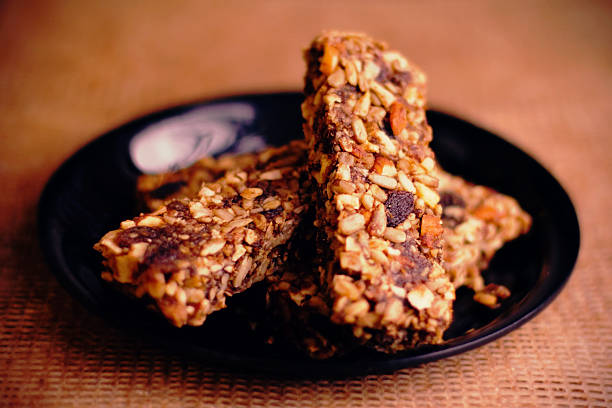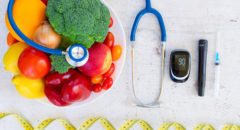
A high intake of ultra-processed foods (UPFs) is associated with an increased risk of early death. Studies have shown a correlation between UPF consumption and a higher risk of all-cause mortality, including from neurodegenerative diseases and other health issues. Some studies suggest that the increased risk may be due to the industrial processing of foods and the use of artificial ingredients.
Americans' increasing consumption of ultra-processed foods is putting their health at risk, researchers warn.
Ultra-processed foods are foods that are ready-to-eat or heat, include additives, and contain little, if any, whole foods. They include frozen pizza, soda, fast food, sweets, salty snacks, canned soup and most breakfast cereals.
Previous research has shown that eating ultra-processed foods is associated with obesity and heart disease.
The New York University investigators analyzed U.S. federal government data and found that the proportion of ultra-processed foods in Americans' diets grew from 53.5% of calories in 2001-2002 to 57% in 2017-2018, while consumption of whole foods fell from 32.7% to 27.4% of calories, mostly due to people eating less meat and dairy.
The greatest increase in ultra-processed foods was in ready-to-eat or heat meals, while intake of some sugary foods and drinks declined, according to the study published Oct. 14 in the American Journal of Clinical Nutrition.
RELATED: 9 Foods You Should Never Eat After Age 30
"The overall composition of the average U.S. diet has shifted towards a more processed diet. This is concerning, as eating more ultra-processed foods is associated with poor diet quality and higher risk of several chronic diseases," study author Filippa Juul, an assistant professor and postdoctoral fellow at NYU's School of Public Health says.
"The high and increasing consumption of ultra-processed foods in the 21st century may be a key driver of the obesity epidemic," Juul adds in a university news release.
The researchers also said the COVID-19 pandemic may have prompted Americans to eat less nutritious foods that have long shelf lives.
"In the early days of the pandemic, people changed their purchasing behaviors to shop less frequently, and sales of ultra-processed foods such as boxed macaroni and cheese, canned soups and snack foods increased substantially. People may have also eaten more packaged 'comfort foods' as a way of coping with the uncertainty of the pandemic," Juul shares.
If you are prone to consume more ultra-processed foods, consider shrinking back on these:
12. Fruit juice

While 100% fruit juice can contain vitamin C and potassium, it can also be an extra source of added sugar and calories. Juice also doesn't contain the same fiber and phytonutrients that raw fruits have.
Alternative: It is better to eat raw fruits than drink fruit juice, but if you prefer to drink your fruit, invest in a juicer so that you can make your own juices and smoothies without the unhealthy ingredients.
11. Potato chips
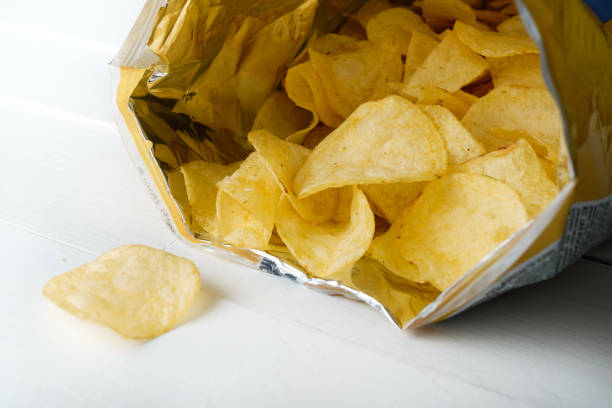
Potato chips are one of the unhealthiest snacks you can grab. They are salty, oily and highly addictive.
Alternative: Instead, try baking potatoes in a pan or making your own chips from veggies.
RELATED: Top 5 Healthy Soul food Alternatives
10. Ketchup

Sorry to break it to you, but although ketchup is made with tomatoes, it holds no nutritional value. Ketchup contains high fructose syrup and nearly 2g of sugar in each packet.
Alternative: Instead, try making your own ketchup with a cup of tomato paste with a teaspoon of vinegar. This way you can control the amount of sugar going in by flavoring it to your taste.
9. Bacon

Bacon contains high levels of sodium, which can lead to high blood pressure and saturated fat, which can lead to heart disease and obesity. Storebought bacon, in particular, contains preservatives, which are linked to headaches and cancer. Additionally processed meats such as bacon and hot dogs have been deemed just as bad as cigarettes due to the number of nitrates they contain. One slice of bacon contains 194 milligrams of sodium.
Alternative: Next time you have a craving for bacon, try avocado instead. Avocado contains healthy fats and proteins and has a hearty rich flavor like bacon. You can try avocado and eggs instead of bacon and eggs or even swap the bacon on your BLT for avocado.
RELATED: Change The Way You Look At Breakfast With These 5 Avocado Toast Recipes!
8. Granola bars
Although granola bars contain hearty grains, they are packed full of sugars that digest quickly and leave you feeling hungry quickly. They are also full of carbs and hard to pronounce ingredients. One granola bar can contain at least 11 grams of sugar.
Alternative: Try making your own granola bars. You can replace the sugar with stevia. Brands like KIND also offer granola bars that are made with less sugar.
7. Flavored Nuts

Nuts that come in maple flavor, soy sauce, wasabi dusted, etc. come packed with added salt and sugar, which can lead to weight gain, high blood pressure and diabetes.
Alternative: Instead stick to the unflavored versions of nuts. Pistachios, walnuts and cashews, all contain protein and good fats.
6. Microwave popcorn
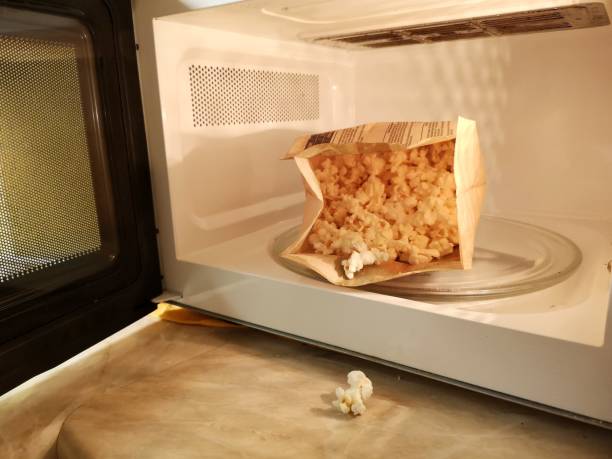
Microwave popcorn contains perfluoroalkyls, which has been linked to impaired kidney function and poor semen quality. According to the AHA, no more than 5 to 6 percent of your daily calories should come from saturated fat. A person who eats 2,000 calories a day would be consuming 11 to 13 g of saturated fat if they add microwave popcorn to the list.
Alternative: Buy corn kernels and pop them on the stove yourself. This allows you to enjoy popcorn without all the unhealthy ingredients.
5. Dried fruit
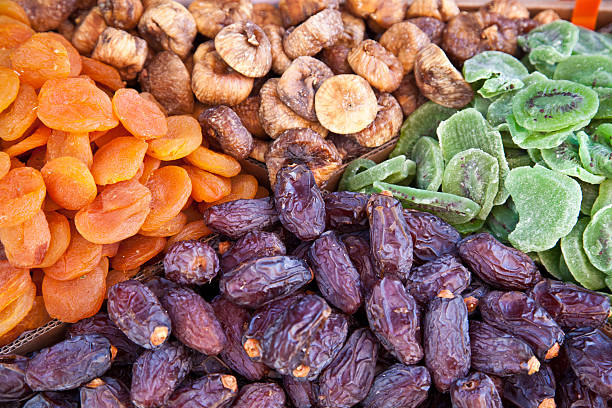
Dried fruit have a great amount of fiber, vitamins and minerals. However, you should be careful with portion size. Just a small portion of dried fruit contains high amounts of calories and sugar. This can lead to weight gain.
Alternative: For a sweet snack, grab a bowl of frozen fruit. Its bite-sized chunks make it versatile and perfect for portion control. You can add it to cereal, smoothies or other beverages.
RELATED: A Low Sugar Diet You Can Actually Enjoy!
4. Fruit snacks

Fruit snacks contain a very small portion of actual fruit. Instead, they are packed with high fructose corn syrup and cane sugar, which are known to increase your risk for weight gain and diabetes.
Alternative: An easy substitute for fruit snacks is real fruit, which is packed with the essential vitamins and minerals you need.
3. Margarine
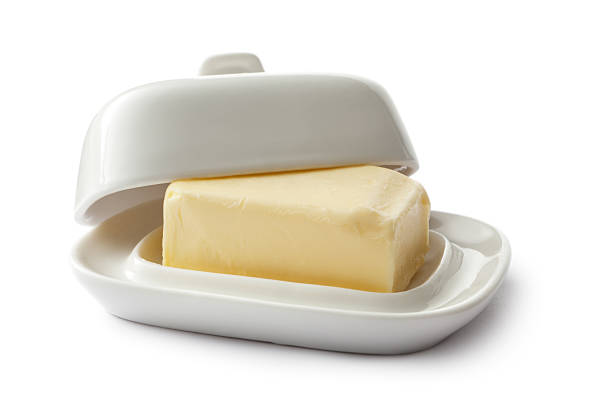
Although margarine has largely been considered a healthy alternative to butter, it contains a lot of trans fats. Trans fats are unhealthier than any other fat and can increase low-density lipoprotein (LDL), or bad cholesterol leading to heart disease and stroke.
Alternative: If you are looking for something with the same consistency as margarine, try mashed avocado. You can also use nut milks and yogurts instead of margarine.
2. Instant ramen
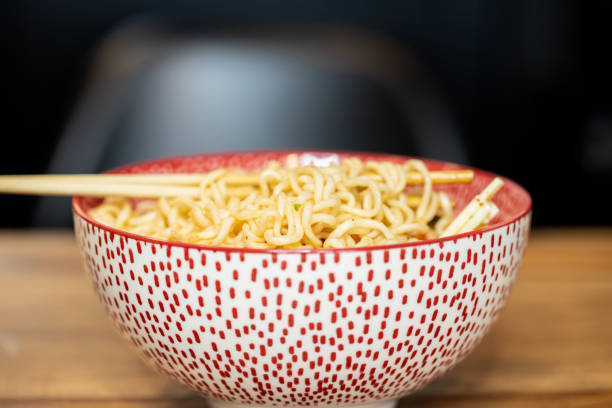
Ramen noodles hold no nutritional value. A packet of ramen contains 14 g of fat and over 1,500 mg of sodium even before you add the flavor packet.
Alternative: Try making zucchini noodles. You can also use zucchini noodles to make any pasta for a healthier option.
1. Frozen dinners
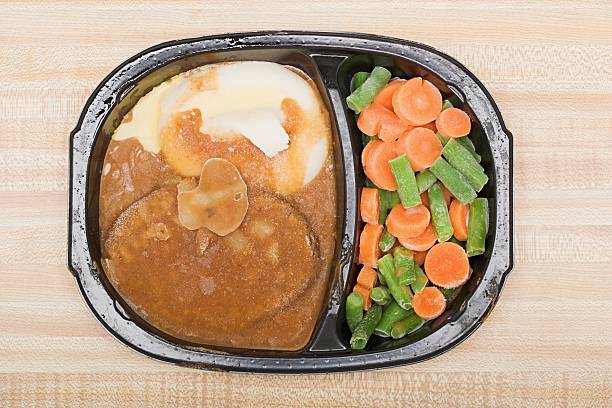
Frozen dinners are packed with sugars, fat and sodium, which leads to weight and heart problems. Consuming too many frozen dinners can also raise your blood pressure and put you at risk of stroke.
Alternative: If you must buy frozen dinners, opt for the organic or low-sodium versions. If you have a little extra time, try recreating your own frozen meals with healthier options that you can cook and freeze for later.
Remember to enjoy everything in moderation. You should check the nutrition labels for ingredients before you purchase anything and never purchase something that contains ingredients that you are unsure of. This will prevent you from getting anything that is high in fats, sugars, and chemicals. If you need additional help, you can consult with your doctor or a dietician.



